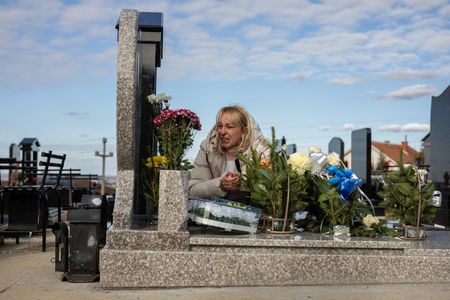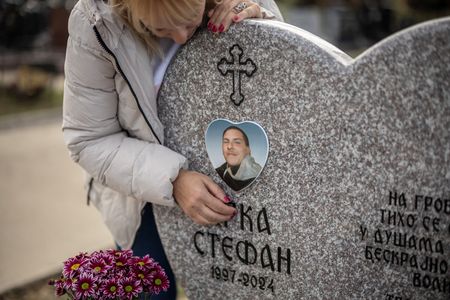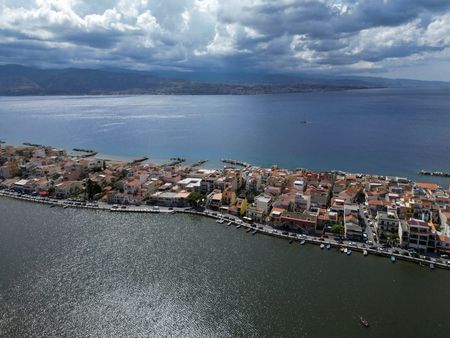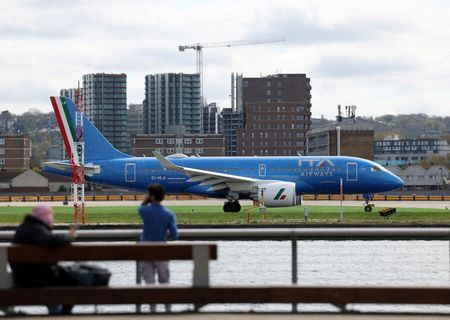By Ivana Sekularac
BELGRADE (Reuters) -Dijana Hrka, 48, whose son was among 16 people killed when the roof of a renovated railway station in Serbia collapsed, is angry with authorities for having held no one accountable a year later.
“The roof didn’t collapse by itself,” she said, standing at her son’s grave in the capital Belgrade. “It collapsed because of corruption and human negligence. I want to know who killed my child.”
The tragedy touched off a largely peaceful, nationwide protest movement led by university students and professors that has shaken President Aleksandar Vučić’s 13-year grip on power. Demonstrators are demanding a snap election, hoping to unseat Vučić and his populist Serbian Progressive Party.
Hrka says she will join a rally planned for the anniversary of the roof collapse on Saturday in the northern Serbian city of Novi Sad, where the disaster occurred.
“I can’t even describe my pain. But I am bitter and dissatisfied because our authorities are not doing their job.”
HIGH-LEVEL CORRUPTION
An independent commission of professors, judges, and technical experts presented the results of its informal investigation to the European Parliament last week.
“Our conclusion is that there is a high degree of corruption reaching the very top of the state,” retired Supreme Court judge Radmila Dičić Dragićević said.
“Corruption led to lowered construction standards and the hiring of unqualified subcontractors.”
Government officials have denied such accusations.
Recently, Vučić and parliament speaker Ana Brnabic, an ex-prime minister, said the roof collapse could have been an act of terrorism, a stance that infuriated critics of the government.
“I don’t think the roof fell by itself, nor was it an accident, a tragedy, or any product of some negligent act for that matter,” she had told Pink TV in August. “I think it was a planned diversion (marking) the start of another colour revolution,” she said, referring to past protest movements in formerly communist post-Soviet and east European states resisting democratic reform.
In September, a Novi Sad prosecutor indicted former construction, infrastructure and transport minister Goran Vesić and 12 others — including one of his aides and the head of the state railway company on charges of endangering public safety, including “irregular and improper construction works”.
But that indictment has yet to be confirmed by the court, preventing a trial from going ahead.
A special prosecutor for organised crime is also conducting an investigation but no details have emerged to date.
Last week, the European Parliament adopted a resolution calling for a transparent investigation into the deadly collapse. The resolution also proposed sending an EU fact-finding mission to Serbia to assess “the state of democracy, ongoing protests and repression against participants”.
‘WE CAN BRING CHANGE’
Several large demonstrations in Belgrade, Novi Sad and Valjevo over the summer were broken up by police using stun grenades and tear gas. Protesters accused police of using excessive force. Reporters Without Borders reported that at least 89 journalists were assaulted during a year of protests.
Vučić’s supporters have set up tents in front of his office and parliament – traditional protest sites in Serbia – to prevent further anti-government rallies there, but in so doing have blocked one of the busiest boulevards in Belgrade.
Vučić, a nationalist turned pro-EU populist, has accused foreign security services of financing the movement against him and insisted his party’s support base remains strong.
However, a recent CRTA opinion poll showed that if elections were held now, Vučić’s party would win just 32% of the vote, while a student-led coalition would receive 44%.
Nikolina Sinđelić, a 22-year-old student, joined the protests at her university in early November 2024, shortly after the roof collapse. Since then, police have summoned her several times for what they describe as “informative talks”.
Nikolina said that in one case she was taken into a basement by police and roughed up by a police commander against whom she had filed a complaint.
“That has changed my life,” she said. “When you are being taken into a basement it is not easy to go out to another protests and say it will all be OK,” Nikolina said.
“Young people have a future. I do have hope that we can bring change.”
(Reporting by Ivana Sekularac; editing by Mark Heinrich)











